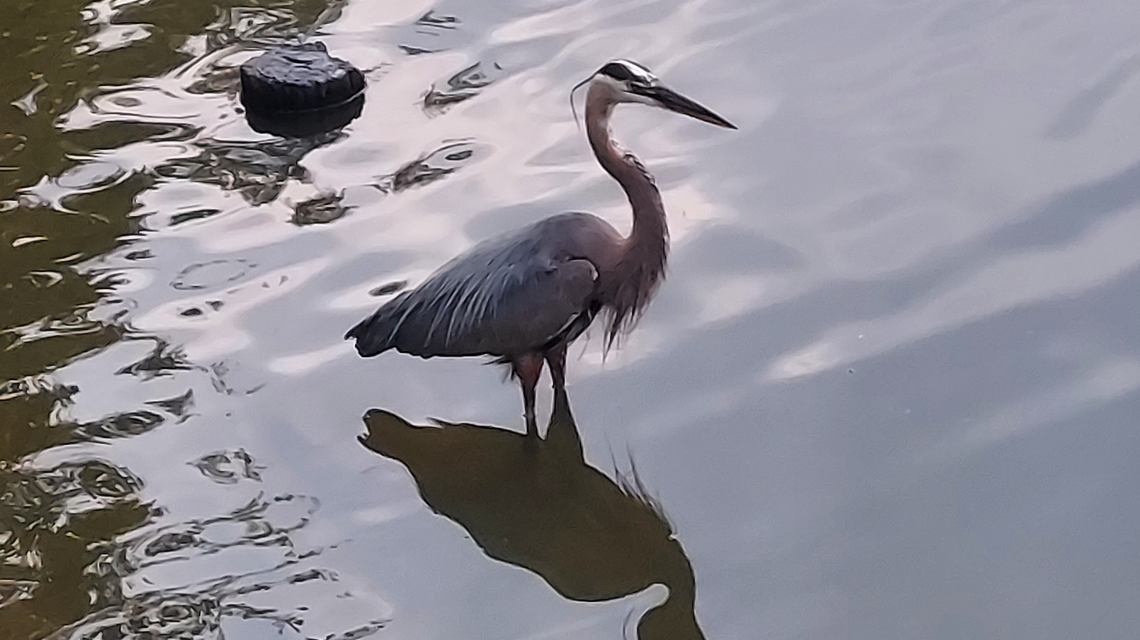Birds Georgia Grant To Restore Bird Habitats Near Lyon Farm

With Georgia’s abundance of birds comes the responsibility to preserve their essential environments, a mission that Birds Georgia has been tackling for years.
With over 250 species of birds residing across Metro Atlanta and hundreds of millions of individuals migrating across Georgia each year, Atlanta is a birder’s dream. Birds Georgia (formerly Georgia Audubon) has been a leading force in local feather-related advocacy, from providing programs and resources for birders to advocating for conservation of avian habitats. Recently, Birds Georgia announced they would be focusing on Arabia Mountain National Heritage Area, specifically by Lyon Farm, along the South River, and adjacent to Panola Mountain State Park near Alexander Lake, thanks to a grant from the National Fish and Wildlife Foundation’s Five Star and Urban Waters Restoration program, the sixth of its kind to be awarded to Birds Georgia.

Dottie Head (right), Director of Communications at Birds Georgia, visited the Heritage Area and walked the stretch of land to be restored with Arabia Alliance members and partners.
The project will take place within the South River watershed on a plot of 10 acres of land by Lyon Farm and will serve as an example for future bird habitat projects along the river. With the help of partners and volunteers, the project will remove non-native and invasive plants and then plant 5,400 native plants, which improve avian habitat, in addition to 40 pounds of seed for future proofing. The project also aims to prime the area for community and partner engagement and to provide opportunities for future volunteer projects, wildlife monitoring and education programs.
Improving Arabia’s Bird Habitats

The South River acts as a crucial migration corridor for birds traveling through the Heritage Area.
Why focus on environmental restoration near Lyon Farm? Birds Georgia Habitat Program Manager Gabe Andrle explained that the area’s proximity to corridors for migration (like the South River), a wide variety of micro habitats and large greenspaces like Panola Mountain made the area appealing for restoration. Additionally, Andrle noted that the site has been an observation point of several declining species such as the Rusty Blackbird, Swainson’s Warbler, Chuck-will’s-widow, Prothonotary Warbler, Indigo Bunting and Kentucky Warbler. “The habitat work that will be done through this project will most directly help species that rely on early successional habitat such as Indigo Bunting, Chuck-will’s-widow, and Prairie Warbler while supporting migration and wintering habitat for some of the other listed species,” said Andrle.
The project will also tackle invasive plants, which are in abundance around the site. Chinese Privet and Bradford Pear don’t much facilitate bird life cycles (like allowing for nesting and habitation of insects for food). These are on a list of plants to be removed from the area and replaced with native trees and shrubs that aid birds and insects they feed on, in turn vitalizing the terrain and increasing biodiversity. The project is currently in its planning phase. Ground work of invasive plant removal will begin in early 2024 and is slated to be completed by next winter, with hopes of expanding the range and appointing workers to continue occasional maintenance.
The Project’s Impact On The Community

Alexander Lake, a part of Panola Mountain State Park, is a popular destination for fishermen, paddlers and birders alike.
In addition to bettering this environment for our feathered friends, Birds Georgia hopes to inspire the surrounding community to join them in their mission. The nonprofit hopes to connect DeKalb County residents to the initiative and will provide volunteer opportunities throughout the next year. “Volunteer work days that will be offered throughout the year will connect people from Birds Georgia, Georgia Native Plant Society, Arabia Mountain Heritage Area Alliance, among other partners to partake in habitat restoration, learn about birds and other wildlife, and the history of Lyon Farm itself,” said Gabe Andrle.
Volunteer activities will include planting, invasive species removal and progress monitoring to ensure project success. Birds Georgia hopes that this project will inspire continued preservation/restoration work with local community members and partners, creating a broader coalition to protect our avian fellows.
If you would like to follow Birds Georgia on their mission and keep up with opportunities to engage, help and volunteer, visit birdsgeorgia.org.